城市学院英语课文翻译word版本
(完整word版)高英课文翻译
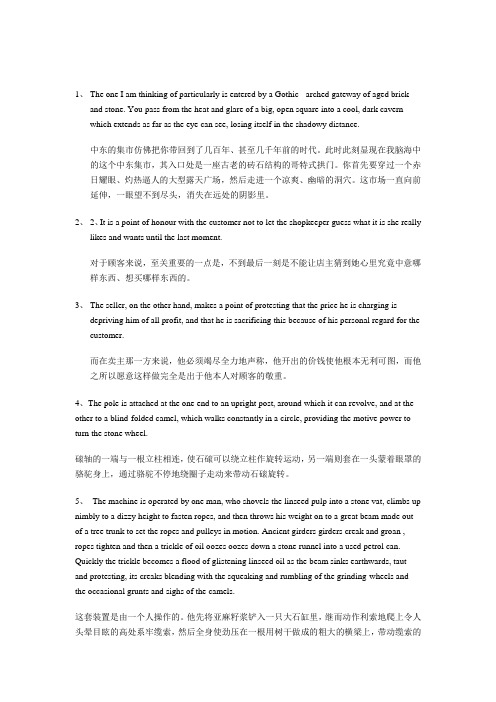
10、Each day that I escape death, each day of suffering that helps to free me fromearthlycares, I make a new little paper bird, and add it to the others. This way I look at them and congratulate myself of the good fortune that my illness has brought me. Because, thanks to it, I have the opportunity to improve my character."
对于顾客来说,至关重要的一点是,不到最后一刻是不能让店主猜到她心里究竟中意哪样东西、想买哪样东西的。
3、The seller, on the other hand, makes a point of protesting that the price he is charging isdepriving him ofall profit, and that he is sacrificing this because of his personal regard for the customer.
每当我从死神那儿挣脱出来的那一天,每当病痛将我从尘世烦恼中解放出来的那一天,我都要叠一只新的小纸鸟,加到原有的纸鸟群里去。我就这样看着这些纸鸟,庆幸病痛给自己带来的好运。因为正是我的病痛使我有了怡养性情的机会。”
11、In real life I am a large, big-boned woman with rough, man-working hands. In the winter I wear flannel nightgowns to bed and overalls during the day. I can kill and clean a hog as mercilessly as a man. My fat keeps me hot in zero weather. I can work outside all day, breaking ice to get water for washing; I can eat pork liver cooked over the open tire minutes after it comes steaming from the hog. One winter I knocked a bull calf straight in the brain between the eyes with a sledge hammer and had the meat hung up to chill be-fore nightfall. But of course all this does not show on television. I am the way my daughter would want me to be: a hundred pounds lighter, my skin like an uncooked barley pan-cake. My hair glistens in the hot bright lights. Johnny Car – son has much to do to keep up with my quick and witty tongue.
2019人教版新教材高中英语必修三全册课文翻译(中英文Word)

Unit 1 | Reading and ThinkingWHY DO WE CELEBRATE FESTIVALS我们为什么庆祝节日?Festivals are celebrated all around the world. They have a wide range of origins, such as the seasons of the year, religions, famous figures, and important events. Every festival has its different customs and unique charms. However, no matter how different they may seem, all over the world, the spirit of sharing joy, gratitude, love, or peace is common in all festivals.世界各地都庆祝各种节日。
节日的由来五花八门,比如时节、宗教、著名人物及重要事件。
每个节日都有其不同的习俗和独特的魅力。
然而,无论它们多么迥异,在世界各地,分享快乐、感恩、友爱或和平的精神存在于所有节日之中。
Of all the traditional festivals, the harvest festival can be found in almost every culture. This important agricultural festival takes place after all the crops have been gathered in. People celebrate to show that they are grateful for the year’s supply of food. In ancient Egypt, the harvest festival was celebrated during the springtime—the Egyptian harvest season. It featured a parade and a great feast with music, dancing, and sports. Today, in some European countries, people decorate churches and town halls with flowers and fruit, and get together to celebrate over a meal. During the Mid-Autumn Festival in China, families gather to admire the shining moon and enjoy delicious mooncakes.在所有的传统节日中,丰收节几乎可见于每一种文化之中。
城市学院英语课文翻译
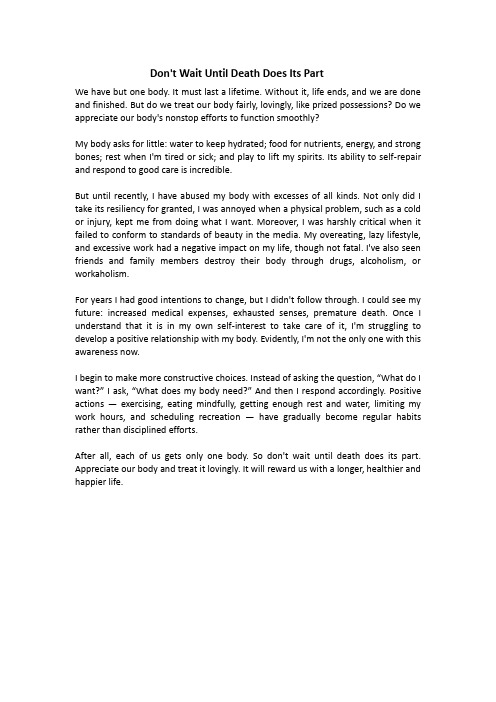
Don't Wait Until Death Does Its PartWe have but one body. It must last a lifetime. Without it, life ends, and we are done and finished. But do we treat our body fairly, lovingly, like prized possessions? Do we appreciate our body's nonstop efforts to function smoothly?My body asks for little: water to keep hydrated; food for nutrients, energy, and strong bones; rest when I'm tired or sick; and play to lift my spirits. Its ability to self-repair and respond to good care is incredible.But until recently, I have abused my body with excesses of all kinds. Not only did I take its resiliency for granted, I was annoyed when a physical problem, such as a cold or injury, kept me from doing what I want. Moreover, I was harshly critical when it failed to conform to standards of beauty in the media. My overeating, lazy lifestyle, and excessive work had a negative impact on my life, though not fatal. I've also seen friends and family members destroy their body through drugs, alcoholism, or workaholism.For years I had good intentions to change, but I didn't follow through. I could see my future: increased medical expenses, exhausted senses, premature death. Once I understand that it is in my own self-interest to take care of it, I'm struggling to develop a positive relationship with my body. Evidently, I'm not the only one with this awareness now.I begin to make more constructive choices. Instead of asking the question, “What do I want?” I ask, “What does my body need?” And then I respond accordingly. Po sitive actions —exercising, eating mindfully, getting enough rest and water, limiting my work hours, and scheduling recreation —have gradually become regular habits rather than disciplined efforts.After all, each of us gets only one body. So don't wait until death does its part. Appreciate our body and treat it lovingly. It will reward us with a longer, healthier and happier life.不要坐等死忙伸出魔爪我们只有一个身体。
大学英文第四段课文翻译
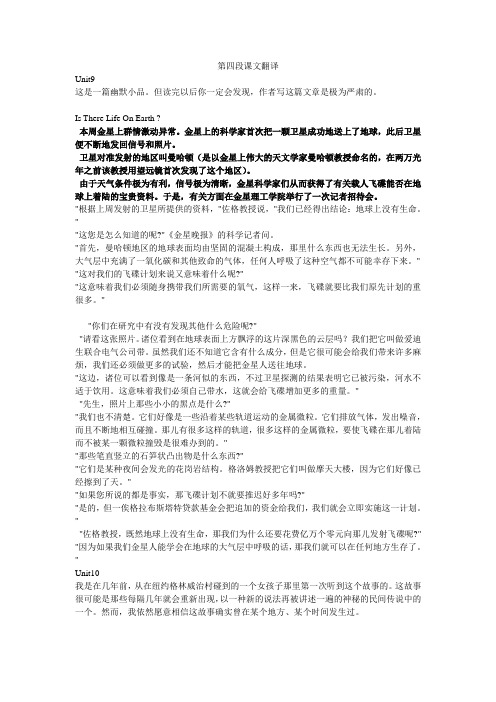
第四段课文翻译Unit9这是一篇幽默小品。
但读完以后你一定会发现,作者写这篇文章是极为严肃的。
Is There Life On Earth ?本周金星上群情激动异常。
金星上的科学家首次把一颗卫星成功地送上了地球,此后卫星便不断地发回信号和照片。
卫星对准发射的地区叫曼哈顿(是以金星上伟大的天文学家曼哈顿教授命名的,在两万光年之前该教授用望远镜首次发现了这个地区)。
由于天气条件极为有利,信号极为清晰,金星科学家们从而获得了有关载人飞碟能否在地球上着陆的宝贵资料。
于是,有关方面在金星理工学院举行了一次记者招待会。
"根据上周发射的卫星所提供的资料,"佐格教授说,"我们已经得出结论:地球上没有生命。
""这您是怎么知道的呢?"《金星晚报》的科学记者问。
"首先,曼哈顿地区的地球表面均由坚固的混凝土构成,那里什么东西也无法生长。
另外,大气层中充满了一氧化碳和其他致命的气体,任何人呼吸了这种空气都不可能幸存下来。
" "这对我们的飞碟计划来说又意味着什么呢?""这意味着我们必须随身携带我们所需要的氧气,这样一来,飞碟就要比我们原先计划的重很多。
""你们在研究中有没有发现其他什么危险呢?""请看这张照片。
诸位看到在地球表面上方飘浮的这片深黑色的云层吗?我们把它叫做爱迪生联合电气公司带。
虽然我们还不知道它含有什么成分,但是它很可能会给我们带来许多麻烦,我们还必须做更多的试验,然后才能把金星人送往地球。
"这边,诸位可以看到像是一条河似的东西,不过卫星探测的结果表明它已被污染,河水不适于饮用。
这意味着我们必须自己带水,这就会给飞碟增加更多的重量。
""先生,照片上那些小小的黑点是什么?""我们也不清楚。
它们好像是一些沿着某些轨道运动的金属微粒。
(完整版)Unit10TheIdiocyofUrbanLife课文翻译综合教程四(2)
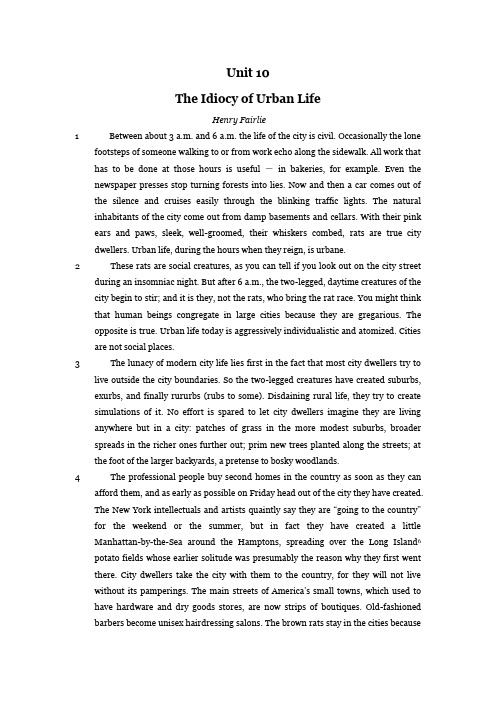
Unit 10The Idiocy of Urban LifeHenry Fairlie1 Between about 3 a.m. and 6 a.m. the life of the city is civil. Occasionally the lonefootsteps of someone walking to or from work echo along the sidewalk. All work that has to be done at those hours is useful -in bakeries, for example. Even the newspaper presses stop turning forests into lies. Now and then a car comes out of the silence and cruises easily through the blinking traffic lights. The natural inhabitants of the city come out from damp basements and cellars. With their pink ears and paws, sleek, well-groomed, their whiskers combed, rats are true city dwellers. Urban life, during the hours when they reign, is urbane.2 These rats are social creatures, as you can tell if you look out on the city streetduring an insomniac night. But after 6 a.m., the two-legged, daytime creatures of the city begin to stir; and it is they, not the rats, who bring the rat race. You might think that human beings congregate in large cities because they are gregarious. The opposite is true. Urban life today is aggressively individualistic and atomized. Cities are not social places.3 The lunacy of modern city life lies first in the fact that most city dwellers try tolive outside the city boundaries. So the two-legged creatures have created suburbs, exurbs, and finally rururbs (rubs to some). Disdaining rural life, they try to create simulations of it. No effort is spared to let city dwellers imagine they are living anywhere but in a city: patches of grass in the more modest suburbs, broader spreads in the richer ones further out; prim new trees planted along the streets; at the foot of the larger backyards, a pretense to bosky woodlands.4 The professional people buy second homes in the country as soon as they canafford them, and as early as possible on Friday head out of the city they have created.The New York intellectuals and artists quaintly say they are “going to the country”for the weekend or the summer, but in fact they have created a little Manhattan-by-the-Sea around the Hamptons, spreading over the Long Island6 potato fields whose earlier solitude was presumably the reason why they first went there. City dwellers take the city with them to the country, for they will not live without its pamperings. The main streets of America’s small towns, which used to have hardware and dry goods stores, are now strips of boutiques. Old-fashioned barbers become unisex hairdressing salons. The brown rats stay in the cities becauseof the filth the humans leave during the day. The rats clean it up at night. Soon the countryside will be just as nourishing to them, as the city dwellers take their filth with them.5 Work still gives meaning to rural life, the family, and churches. But in the citytoday work and home, family and church, are separated. What the office workers do for a living is not part of their home life. At the same time they maintain the pointless frenzy of their work hours in their hours off. They rush from the office to jog, to the gym or the YMCA pool, to work at their play with the same joylessness.6 Even though the offices of today’s businesses in the city are themselves movingout to the suburbs, this does not necessarily bring the workers back closer to their workplace. It merely means that to the rush-hour traffic into the city there is now added a rush-hour traffic out to the suburbs in the morning, and back around and across the city in the evening. As the farmer walks down to his farm in the morning, the city dweller is dressing for the first idiocy of his day, which he not only accepts but even seeks -the journey to work.7 In the modern office building in the city there are windows that don’t open. Thisis perhaps the most symbolic lunacy of all. Outdoors is something you can look at through glass but not to touch or hear. These windows are a scandal because they endanger the lives of office workers in case of fire. But no less grievous, even on the fairest spring or fall day the workers cannot put their heads outside. Thus it is not surprising that the urban worker has no knowledge of the seasons. He is aware simply that in some months there is air conditioning, and in others through the same vents come fetid central heating. Even outside at home in their suburbs the city dw ellers may know that sometimes it’s hot, and sometimes it’s cold, but no true sense of the rhythms of the seasons is to be had from a lawn in the backyard and a few spindly trees struggling to survive.8 The city dweller reels from unreality to unreality through each day, alwaystrying to recover the rural life that has been surrendered for the city lights. No city dweller, even in the suburbs, knows the wonder of a pitch-dark country lane at night.Nor does he naturally get any exercise from his work.9 Every European points out that Americans are the most round-shoulderedpeople in the world. Few of them carry themselves with an upright stance, althougha correct stance is the first precondition of letting your lungs breathe naturally anddeeply. Electric typewriters cut down the amount of physical exertion needed to hit the keys; the buttons of a word processor need even less effort, as you can tell fromthe posture of those who use them. They rush out to jog or otherwise Fonda-ize their leisure to try to repair the damage done during the day.10 Everything in urban life is an effort either to simulate rural life or to compensatefor its loss by artificial means. It is from this day-to-day existence of unreality, pretence, and idiocy that the city people, slumping along their streets even when scurrying, never looking up at their buildings, far less the sky, have the insolence to disdain and mock the useful and rewarding life of the country people who support them. Now go out and carry home a Douglas fir, call it a Christmas tree, and enjoy 12 days of contact with nature. Of course city dwellers don’t know it once had roots.城市生活之蠢行亨利·费尔利1 每天凌晨3点到6点,城市生活文明有礼。
北京城市学院大学英语一Book 1-Unit 1-In-depth Reading

of t我h可e 以m一o个st月e不x去ci上ti课n还g能ti照m常e毕s 业of。your life.
graduation n. 毕业
Unit 1 Into the Ivory Tower
In-depth Reading
(1) Firaasbdtrvo. a在do国f外,a到ll国, 外 ctroavnelg/groa/litvue laabrtoiaodns on ggrraadduuaattiin*ng小g时f候ro,m我们h从ig未h去过sc国h外o。ol! Soon, you
chanlleenwge friends await you. What you do in
n. 挑战 challenge of sth./doing sth. pose a challenge to sb.
facye/omeuert/tafkierascthaylleenager of college can have a big * 他im愿p意a接c受t 各o种n角t色h的e 挑r战es。t of your college years
Unit 1 Into the Ivory Tower
Activating
Step 2: Work in pairs and discuss with your partner the following questions. Keep a record of what he/she says in the space provided below.
Unit 1 Into the Ivory Tower
Activating
Step 2: Work in pairs and discuss with your partner the following questions. Keep a record of what he/she says in the space provided below.
大学生英语教材2课文翻译
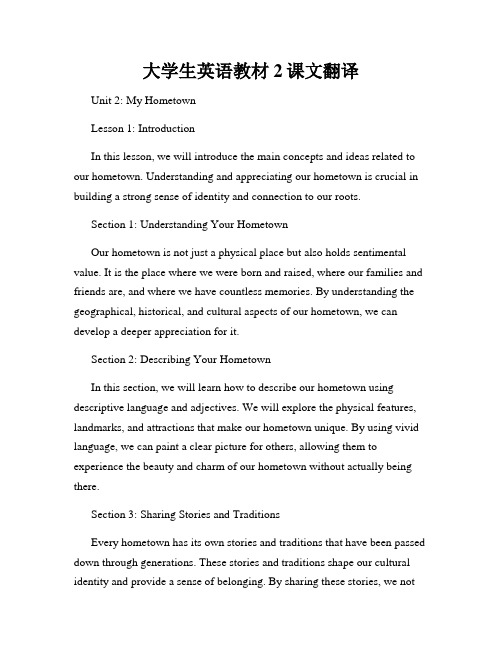
大学生英语教材2课文翻译Unit 2: My HometownLesson 1: IntroductionIn this lesson, we will introduce the main concepts and ideas related to our hometown. Understanding and appreciating our hometown is crucial in building a strong sense of identity and connection to our roots.Section 1: Understanding Your HometownOur hometown is not just a physical place but also holds sentimental value. It is the place where we were born and raised, where our families and friends are, and where we have countless memories. By understanding the geographical, historical, and cultural aspects of our hometown, we can develop a deeper appreciation for it.Section 2: Describing Your HometownIn this section, we will learn how to describe our hometown using descriptive language and adjectives. We will explore the physical features, landmarks, and attractions that make our hometown unique. By using vivid language, we can paint a clear picture for others, allowing them to experience the beauty and charm of our hometown without actually being there.Section 3: Sharing Stories and TraditionsEvery hometown has its own stories and traditions that have been passed down through generations. These stories and traditions shape our cultural identity and provide a sense of belonging. By sharing these stories, we notonly preserve our heritage but also give others a glimpse into the rich history of our hometown.Section 4: Comparing HometownsIn this section, we will compare our hometowns with those of our classmates. By understanding the similarities and differences, we can broaden our perspective and gain a better understanding of the world. This exercise encourages cultural exchange and fosters a deep appreciation for diversity.Lesson 2: My Hometown's HistoryIn this lesson, we will delve deeper into the historical aspect of our hometowns. Learning about the historical events and figures that have shaped our hometowns helps us develop a better understanding of our heritage.Section 1: Historical TimelineWe will create a historical timeline of our hometown, starting from its foundation to the present day. By examining key events and influential figures, we can see how our hometown has evolved over time. This exercise highlights the importance of preserving historical records and cherishing our cultural heritage.Section 2: Historical LandmarksEvery hometown has historical landmarks that serve as a reminder of its past. We will explore these landmarks, their significance, and how theycontribute to the overall identity of our hometown. By appreciating these landmarks, we can develop a sense of pride and inspire others to do the same.Section 3: Local Legends and HeroesMany hometowns have their own local legends and heroes, whose stories have become a part of their folklore. We will explore these legends and heroes, discovering the values they embody and the lessons they teach. By celebrating these figures, we ensure that their legacies are not forgotten and continue to inspire future generations.Lesson 3: Celebrating Our HometownIn this lesson, we will focus on the various festivals, traditions, and celebrations that take place in our hometown. These cultural events not only provide entertainment but also serve as a platform for preserving and promoting our local traditions.Section 1: Festivals and CelebrationsWe will explore the different festivals and celebrations that are unique to our hometown. By understanding the significance behind these events, we can actively participate and promote them to ensure their continuity. These festivals provide an opportunity for locals and visitors alike to come together and experience the vibrancy of our hometown's culture.Section 2: Local CuisineFood plays a significant role in any culture, and our hometown's cuisine is no exception. We will showcase the distinctive dishes and culinary traditions that are native to our hometown. By sharing these recipes andstories, we can introduce our hometown's flavors to a wider audience and keep our culinary heritage alive.Section 3: Traditional Arts and CraftsTraditional arts and crafts are an integral part of our hometown's cultural heritage. We will explore the various artistic mediums and craftsmanship that have been passed down through generations. By showcasing these talents, we can preserve our traditional arts and crafts and support local artisans.ConclusionUnderstanding and celebrating our hometown is a way to honor our roots and preserve our cultural heritage. By exploring its history, traditions, and attractions, we can develop a stronger sense of identity and foster a connection to our homeland. Let us embrace and share the beauty of our hometowns, allowing others to appreciate their uniqueness and fostering a sense of unity and cultural exchange.。
高职大二英语课文翻译

The First McDonald's RestaurantEven though the first McDonald's restaurant sold only hamburgers and French fries, it still became a cultural symbol.Now, in the Southern California city of Downey, people are trying to save the first McDonald's restaurant in history.McDonald's, though, says the building should be torn down.Built in 1953, the restaurant in Downey, California, is the oldest of all the Golden Arches in America, and has the earliest McDonald's building design.Many people have good memories of that old McDonald's.These people are angry that the building is now in danger of being destroyed, along with their memories.McDonald's explains that the building was damaged in an earthquake, and therefore needs to be torn down.Many people in the town of Downey don't agree with this line of thinking, though.One woman says, "I think it's terrible. They are using the earthquake as an excuse. It's a big lie."Another Downey resident remarks, "I am so upset. They don't respect the public at all. They haven't even tried. They could do some small repairs and make it a good restaurant again."McDonald's managers say the restaurant is losing money at that location. There is no room for a drive-thru window, or for seating inside.After the earthquake, they say it was impossible to fix.The managers want to build a copy of this building at another location instead.Building inspectors, on the other hand, say that the structure can be repaired, but that it will be expensive.Many people say that McDonald's can certainly afford to pay that amount.Some think that McDonald's real reason for wanting to close down the restaurant has nothing to do with money.Modern McDonald's restaurants often have a sign claiming that a man named Ray Kroc opened the first McDonald's restaurant in Illinois in 1955.The truth, however, is that Mr. Kroc actually learned the fast food business from Dick and Mac McDonald in ter, Mr. Kroc bought their restaurants.Thus, many people in Downey think McDonald's is trying to change history, though the company denies this.To local historians, this explanation makes total sense.One historian said, "We should not rewrite the past. Ray Kroc did not invent McDonald's. The McDonald brothers did."These days, a group of historians want the building to be added to the National Register of Historic Places so that the city of Downey will be able to stop McDonald's from tearing the building down.The McDonald's managers are very angry, and have abandoned the structure.Everyone hopes that the McDonald's managers and the people of Downey will soon find peace.The building is still there, but boards cover the windows.Even so, people drive by to remember their McDonald's, taking pictures of a moment in history before it gets taken away.第一家麦当劳餐馆虽说第一家麦当劳餐馆只售汉堡包和薯条,它还是成为了一种文化象征。
城市学院英语课文翻译
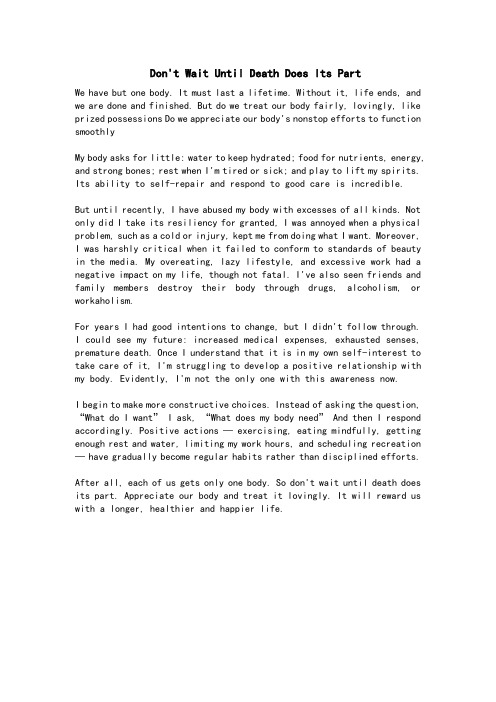
Don't Wait Until Death Does Its PartWe have but one body. It must last a lifetime. Without it, life ends, and we are done and finished. But do we treat our body fairly, lovingly, like prized possessions Do we appreciate our body's nonstop efforts to function smoothlyMy body asks for little: water to keep hydrated; food for nutrients, energy, and strong bones; rest when I'm tired or sick; and play to lift my spirits. Its ability to self-repair and respond to good care is incredible.But until recently, I have abused my body with excesses of all kinds. Not only did I take its resiliency for granted, I was annoyed when a physical problem, such as a cold or injury, kept me from doing what I want. Moreover, I was harshly critical when it failed to conform to standards of beauty in the media. My overeating, lazy lifestyle, and excessive work had a negative impact on my life, though not fatal. I've also seen friends and family members destroy their body through drugs, alcoholism, or workaholism.For years I had good intentions to change, but I didn't follow through.I could see my future: increased medical expenses, exhausted senses, premature death. Once I understand that it is in my own self-interest to take care of it, I'm struggling to develop a positive relationship with my body. Evidently, I'm not the only one with this awareness now.I begin to make more constructive choices. Instead of asking the question, “What do I want” I ask, “What does my body need” And then I respond accordingly. Positive actions — exercising, eating mindfully, getting enough rest and water, limiting my work hours, and scheduling recreation —have gradually become regular habits rather than disciplined efforts.After all, each of us gets only one body. So don't wait until death does its part. Appreciate our body and treat it lovingly. It will reward us with a longer, healthier and happier life.不要坐等死忙伸出魔爪我们只有一个身体。
(完整word版)全新版大学英语综合教程3课文原文及翻译完整版

unit 1 Mr. Doherty Builds His Dream LifeIn America many people have a romantic idea of life in the countryside. Many living in towns dream of starting up their own farm, of living off the land. Few get round to putting their dreams into practice. This is perhaps just as well, as the life of a farmer is far from easy, as Jim Doherty discovered when he set out to combine being a writer with running a farm. Nevertheless, as he explains, he has no regrets and remains enthusiastic about his decision to change his way of life.在美国,不少人对乡村生活怀有浪漫的情感。
许多居住在城镇的人梦想着自己办个农场,梦想着靠土地为生。
很少有人真去把梦想变为现实。
或许这也没有什么不好,因为,正如吉姆·多尔蒂当初开始其写作和农场经营双重生涯时所体验到的那样,农耕生活远非轻松自在。
但他写道,自己并不后悔,对自己作出的改变生活方式的决定仍热情不减。
Mr. Doherty Builds His Dream LifeJim Doherty1 There are two things I have always wanted to do -- write and live on a farm. Today I'm doing both. I am not in E. B. White's class as a writer or in my neighbors' league as a farmer, but I'm getting by. And after years of frustration with city and suburban living, my wife Sandy and I have finally found contentment here in the country.有两件事是我一直想做的――写作与务农。
大学英语教材四课文翻译

大学英语教材四课文翻译Unit 4: A Trip to New York课文一:在纽约的第一天在纽约的第一天,我们参观了帝国大厦。
这座建筑是纽约的象征之一,被誉为世界上最著名的摩天大楼之一。
我们爬上摩天大楼的观景台,可以欣赏到整个城市的美景。
纽约的高楼大厦、繁忙的街道和五彩斑斓的灯光给了我们深刻的印象。
课文二:在纽约的第二天在纽约的第二天,我们参观了自由女神像。
这是一座巨大的铜像,象征着自由和民主。
我们乘坐游船前往自由岛,可以近距离欣赏到这座雄伟的雕塑。
在岛上,我们还参观了博物馆,了解了自由女神像的历史和文化意义。
课文三:在纽约的第三天在纽约的第三天,我们去了百老汇看音乐剧。
百老汇是世界上最闻名的剧院区之一,吸引了许多优秀的演员和剧目。
我们观看了一场精彩的音乐剧,表演者们的才艺令人惊叹。
这是一次难忘的文化体验。
课文四:在纽约的最后一天在纽约的最后一天,我们逛了时代广场和第五大道。
时代广场是一个繁忙的商业中心,有很多著名的商店和百货公司。
第五大道则是纽约最著名的购物街区之一,拥有众多奢侈品牌店铺。
我们在这里购物的同时,还欣赏到了一些街头表演和艺术品。
总结:这次在纽约的旅行给我们留下了深刻的印象。
无论是感受到纽约的城市魅力,还是欣赏到了丰富的文化和艺术,我们都收获了很多。
通过这次旅行,我们提高了英语沟通和交流的能力,也增长了见识。
这个文章的格式是以课文为主题,采用了小节的方式来呈现内容。
通过描述每天在纽约的活动和景点参观,读者可以清晰地了解整个旅行的流程。
同时,语句通顺、表达流畅,整篇文章充满着对纽约的向往和赞美。
尽管没有列出具体的小节和标题,但通过不同的课文段落,可以明显地划分出各个小节的内容。
文章结尾处的总结旨在对整个旅行进行简洁的总结,以突出旅行的重要性和所带来的好处。
总体而言,这篇文章以清晰、准确的内容完成了大学英语教材四课文的翻译任务。
同时,排版整洁美观,符合要求。
Unit-10-The-Idiocy-of-Urban-Life课文翻译综合教程四
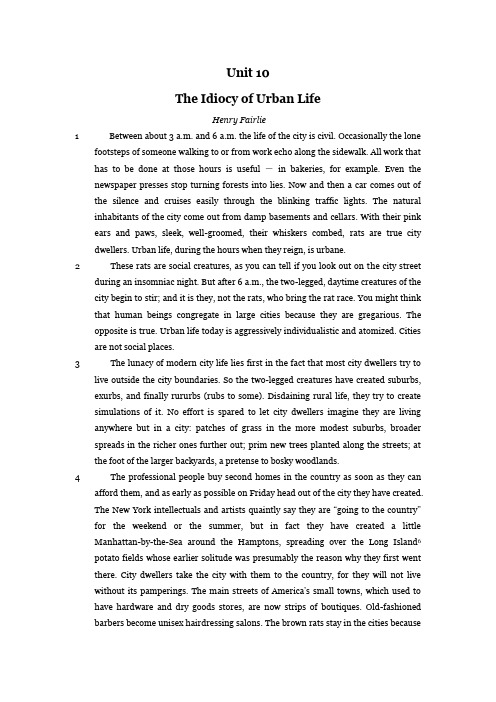
Unit 10The Idiocy of Urban LifeHenry Fairlie1 Between about 3 a.m. and 6 a.m. the life of the city is civil. Occasionally the lonefootsteps of someone walking to or from work echo along the sidewalk. All work that has to be done at those hours is useful -in bakeries, for example. Even the newspaper presses stop turning forests into lies. Now and then a car comes out of the silence and cruises easily through the blinking traffic lights. The natural inhabitants of the city come out from damp basements and cellars. With their pink ears and paws, sleek, well-groomed, their whiskers combed, rats are true city dwellers. Urban life, during the hours when they reign, is urbane.2 These rats are social creatures, as you can tell if you look out on the city streetduring an insomniac night. But after 6 a.m., the two-legged, daytime creatures of the city begin to stir; and it is they, not the rats, who bring the rat race. You might think that human beings congregate in large cities because they are gregarious. The opposite is true. Urban life today is aggressively individualistic and atomized. Cities are not social places.3 The lunacy of modern city life lies first in the fact that most city dwellers try tolive outside the city boundaries. So the two-legged creatures have created suburbs, exurbs, and finally rururbs (rubs to some). Disdaining rural life, they try to create simulations of it. No effort is spared to let city dwellers imagine they are living anywhere but in a city: patches of grass in the more modest suburbs, broader spreads in the richer ones further out; prim new trees planted along the streets; at the foot of the larger backyards, a pretense to bosky woodlands.4 The professional people buy second homes in the country as soon as they canafford them, and as early as possible on Friday head out of the city they have created.The New York intellectuals and artists quaintly say they are “going to the country”for the weekend or the summer, but in fact they have created a little Manhattan-by-the-Sea around the Hamptons, spreading over the Long Island6 potato fields whose earlier solitude was presumably the reason why they first went there. City dwellers take the city with them to the country, for they will not live without its pa mperings. The main streets of America’s small towns, which used to have hardware and dry goods stores, are now strips of boutiques. Old-fashioned barbers become unisex hairdressing salons. The brown rats stay in the cities becauseof the filth the humans leave during the day. The rats clean it up at night. Soon the countryside will be just as nourishing to them, as the city dwellers take their filth with them.5 Work still gives meaning to rural life, the family, and churches. But in the citytoday work and home, family and church, are separated. What the office workers do for a living is not part of their home life. At the same time they maintain the pointless frenzy of their work hours in their hours off. They rush from the office to jog, to the gym or the YMCA pool, to work at their play with the same joylessness.6 Even though the offices of today’s businesses in the city are themselves movingout to the suburbs, this does not necessarily bring the workers back closer to their workplace. It merely means that to the rush-hour traffic into the city there is now added a rush-hour traffic out to the suburbs in the morning, and back around and across the city in the evening. As the farmer walks down to his farm in the morning, the city dweller is dressing for the first idiocy of his day, which he not only accepts but even seeks -the journey to work.7 In the modern office building in the city there are windows that don’t open. Thisis perhaps the most symbolic lunacy of all. Outdoors is something you can look at through glass but not to touch or hear. These windows are a scandal because they endanger the lives of office workers in case of fire. But no less grievous, even on the fairest spring or fall day the workers cannot put their heads outside. Thus it is not surprising that the urban worker has no knowledge of the seasons. He is aware simply that in some months there is air conditioning, and in others through the same vents come fetid central heating. Even outside at home in their suburbs the city dwellers may know that sometimes it’s hot, and sometimes it’s cold, but no true sense of the rhythms of the seasons is to be had from a lawn in the backyard and a few spindly trees struggling to survive.8 The city dweller reels from unreality to unreality through each day, alwaystrying to recover the rural life that has been surrendered for the city lights. No city dweller, even in the suburbs, knows the wonder of a pitch-dark country lane at night.Nor does he naturally get any exercise from his work.9 Every European points out that Americans are the most round-shoulderedpeople in the world. Few of them carry themselves with an upright stance, althougha correct stance is the first precondition of letting your lungs breathe naturally anddeeply. Electric typewriters cut down the amount of physical exertion needed to hit the keys; the buttons of a word processor need even less effort, as you can tell fromthe posture of those who use them. They rush out to jog or otherwise Fonda-ize their leisure to try to repair the damage done during the day.10 Everything in urban life is an effort either to simulate rural life or to compensatefor its loss by artificial means. It is from this day-to-day existence of unreality, pretence, and idiocy that the city people, slumping along their streets even when scurrying, never looking up at their buildings, far less the sky, have the insolence to disdain and mock the useful and rewarding life of the country people who support them. Now go out and carry home a Douglas fir, call it a Christmas tree, and enjoy 12 days of contact with nature. Of course city dwellers don’t know it once had roots.城市生活之蠢行亨利·费尔利1 每天凌晨3点到6点,城市生活文明有礼。
unit10theidiocyofurbanlife课文翻译综合教程四

U n i t10T h eI d i o c y o f U r b a n L i f e课文翻译综合教程四-CAL-FENGHAI.-(YICAI)-Company One1Unit 10The Idiocy of Urban LifeHenry Fairlie1 Between about 3 . and 6 . the life of the city is civil. Occasionally the lonefootsteps of someone walking to or from work echo along the sidewalk. Allwork that has to be done at those hours is useful - in bakeries, for example.Even the newspaper presses stop turning forests into lies. Now and then a car comes out of the silence and cruises easily through the blinking traffic lights.The natural inhabitants of the city come out from damp basements and cellars.With their pink ears and paws, sleek, well-groomed, their whiskers combed,rats are true city dwellers. Urban life, during the hours when they reign, isurbane.2 These rats are social creatures, as you can tell if you look out on the city street during aninsomniac night. But after 6 ., the two-legged, daytime creatures of the city begin to stir;and it is they, not the rats, who bring the rat race. You might think that human beings congregate in large cities because they are gregarious. The opposite is true. Urban life today is aggressively individualistic and atomized. Cities are not social places.3 The lunacy of modern city life lies first in the fact that most city dwellers try tolive outside the city boundaries. So the two-legged creatures have createdsuburbs, exurbs, and finally rururbs (rubs to some). Disdaining rural life, they try to create simulations of it. No effort is spared to let city dwellers imaginethey are living anywhere but in a city: patches of grass in the more modestsuburbs, broader spreads in the richer ones further out; prim new treesplanted along the streets; at the foot of the larger backyards, a pretense tobosky woodlands.4 The professional people buy second homes in the country as soon as they canafford them, and as early as possible on Friday head out of the city they have created. The New York intellectuals and artists quaintly say they are “going to the country” for the weekend or the summer, but in fact they have created a little Manhattan-by-the-Sea around the Hamptons, spreading over the LongIsland6 potato fields whose earlier solitude was presumably the reason whythey first went there. City dwellers take the city with them to the country, for they will not live without its pamperings. The main streets of America’s small towns, which used to have hardware and dry goods stores, are now strips ofboutiques. Old-fashioned barbers become unisex hairdressing salons. Thebrown rats stay in the cities because of the filth the humans leave during the day. The rats clean it up at night. Soon the countryside will be just as nourishing to them, as the city dwellers take their filth with them.5 Work still gives meaning to rural life, the family, and churches. But in the city today workand home, family and church, are separated. What the office workers do for a living is not part of their home life. At the same time they maintain the pointless frenzy of their work hours in their hours off. They rush from the office to jog, to the gym or the YMCA pool, to work at their play with the same joylessness.6 Even though the offices of today’s businesses in the city are themselves movingout to the suburbs, this does not necessarily bring the workers back closer to their workplace. It merely means that to the rush-hour traffic into the citythere is now added a rush-hour traffic out to the suburbs in the morning, and back around and across the city in the evening. As the farmer walks down to his farm in the morning, the city dweller is dressing for the first idiocy of his day, which he not only accepts but even seeks - the journey to work.7 In the modern office building in the city there are windows that don’t open. This is perhapsthe most symbolic lunacy of all. Outdoors is something you can look at through glass but not to touch or hear. These windows are a scandal because they endanger the lives of office workers in case of fire. But no less grievous, even on the fairest spring or fall day the workers cannot put their heads outside. Thus it is not surprising that the urban worker has no knowledge of the seasons. He is aware simply that in some months there is air conditioning, and in others through the same vents come fetid central heating. Even outside at home in their suburbs the city dwellers may know that sometimes it’s hot, and sometimes it’s cold, but no true sense of the rhythms of the seasons is to be had from a lawn in the backyard and a few spindly trees struggling to survive.8 The city dweller reels from unreality to unreality through each day, always trying to recoverthe rural life that has been surrendered for the city lights. No city dweller, even in the suburbs, knows the wonder of a pitch-dark country lane at night. Nor does he naturally get any exercise from his work.9 Every European points out that Americans are the most round-shouldered people in theworld. Few of them carry themselves with an upright stance, although a correct stance is the first precondition of letting your lungs breathe naturally and deeply. Electric typewriters cut down the amount of physical exertion needed to hit the keys; the buttons of a word processor need even less effort, as you can tell from the posture of those who use them.They rush out to jog or otherwise Fonda-ize their leisure to try to repair the damage done during the day.10 Everything in urban life is an effort either to simulate rural life or to compensate for its lossby artificial means. It is from this day-to-day existence of unreality, pretence, and idiocy that the city people, slumping along their streets even when scurrying, never looking up at their buildings, far less the sky, have the insolence to disdain and mock the useful and rewarding life of the country people who support them. Now go out and carry home a Douglas fir, call it a Christmas tree, and enjoy 12 days of contact with nature. Of course city dwellers don’t know it once had roots.城市生活之蠢行亨利·费尔利1 每天凌晨3点到6点,城市生活文明有礼。
(完整版)Unit10TheIdiocyofUrbanLife课文翻译综合教程四
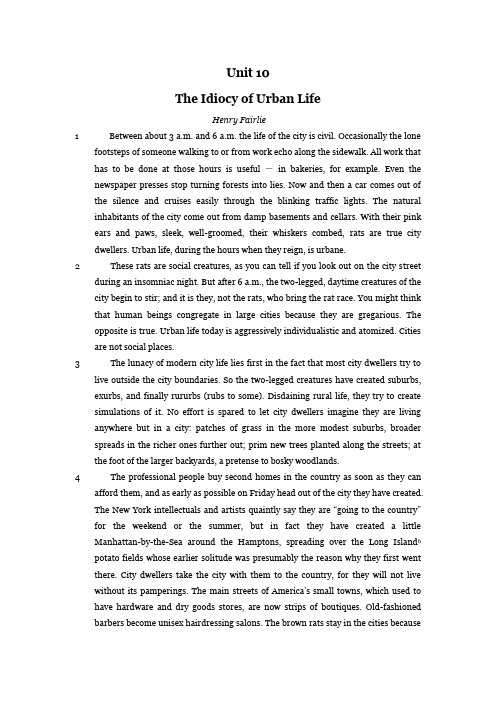
Unit 10The Idiocy of Urban LifeHenry Fairlie1 Between about 3 a.m. and 6 a.m. the life of the city is civil. Occasionally the lonefootsteps of someone walking to or from work echo along the sidewalk. All work that has to be done at those hours is useful -in bakeries, for example. Even the newspaper presses stop turning forests into lies. Now and then a car comes out of the silence and cruises easily through the blinking traffic lights. The natural inhabitants of the city come out from damp basements and cellars. With their pink ears and paws, sleek, well-groomed, their whiskers combed, rats are true city dwellers. Urban life, during the hours when they reign, is urbane.2 These rats are social creatures, as you can tell if you look out on the city streetduring an insomniac night. But after 6 a.m., the two-legged, daytime creatures of the city begin to stir; and it is they, not the rats, who bring the rat race. You might think that human beings congregate in large cities because they are gregarious. The opposite is true. Urban life today is aggressively individualistic and atomized. Cities are not social places.3 The lunacy of modern city life lies first in the fact that most city dwellers try tolive outside the city boundaries. So the two-legged creatures have created suburbs, exurbs, and finally rururbs (rubs to some). Disdaining rural life, they try to create simulations of it. No effort is spared to let city dwellers imagine they are living anywhere but in a city: patches of grass in the more modest suburbs, broader spreads in the richer ones further out; prim new trees planted along the streets; at the foot of the larger backyards, a pretense to bosky woodlands.4 The professional people buy second homes in the country as soon as they canafford them, and as early as possible on Friday head out of the city they have created.The New York intellectuals and artists quaintly say they are “going to the country”for the weekend or the summer, but in fact they have created a little Manhattan-by-the-Sea around the Hamptons, spreading over the Long Island6 potato fields whose earlier solitude was presumably the reason why they first went there. City dwellers take the city with them to the country, for they will not live without its pamperings. The main streets of America’s small towns, which used to have hardware and dry goods stores, are now strips of boutiques. Old-fashioned barbers become unisex hairdressing salons. The brown rats stay in the cities becauseof the filth the humans leave during the day. The rats clean it up at night. Soon the countryside will be just as nourishing to them, as the city dwellers take their filth with them.5 Work still gives meaning to rural life, the family, and churches. But in the citytoday work and home, family and church, are separated. What the office workers do for a living is not part of their home life. At the same time they maintain the pointless frenzy of their work hours in their hours off. They rush from the office to jog, to the gym or the YMCA pool, to work at their play with the same joylessness.6 Even though the offices of today’s businesses in the city are themselves movingout to the suburbs, this does not necessarily bring the workers back closer to their workplace. It merely means that to the rush-hour traffic into the city there is now added a rush-hour traffic out to the suburbs in the morning, and back around and across the city in the evening. As the farmer walks down to his farm in the morning, the city dweller is dressing for the first idiocy of his day, which he not only accepts but even seeks -the journey to work.7 In the modern office building in the city there are windows that don’t open. Thisis perhaps the most symbolic lunacy of all. Outdoors is something you can look at through glass but not to touch or hear. These windows are a scandal because they endanger the lives of office workers in case of fire. But no less grievous, even on the fairest spring or fall day the workers cannot put their heads outside. Thus it is not surprising that the urban worker has no knowledge of the seasons. He is aware simply that in some months there is air conditioning, and in others through the same vents come fetid central heating. Even outside at home in their suburbs the city dw ellers may know that sometimes it’s hot, and sometimes it’s cold, but no true sense of the rhythms of the seasons is to be had from a lawn in the backyard and a few spindly trees struggling to survive.8 The city dweller reels from unreality to unreality through each day, alwaystrying to recover the rural life that has been surrendered for the city lights. No city dweller, even in the suburbs, knows the wonder of a pitch-dark country lane at night.Nor does he naturally get any exercise from his work.9 Every European points out that Americans are the most round-shoulderedpeople in the world. Few of them carry themselves with an upright stance, althougha correct stance is the first precondition of letting your lungs breathe naturally anddeeply. Electric typewriters cut down the amount of physical exertion needed to hit the keys; the buttons of a word processor need even less effort, as you can tell fromthe posture of those who use them. They rush out to jog or otherwise Fonda-ize their leisure to try to repair the damage done during the day.10 Everything in urban life is an effort either to simulate rural life or to compensatefor its loss by artificial means. It is from this day-to-day existence of unreality, pretence, and idiocy that the city people, slumping along their streets even when scurrying, never looking up at their buildings, far less the sky, have the insolence to disdain and mock the useful and rewarding life of the country people who support them. Now go out and carry home a Douglas fir, call it a Christmas tree, and enjoy 12 days of contact with nature. Of course city dwellers don’t know it once had roots.城市生活之蠢行亨利·费尔利1 每天凌晨3点到6点,城市生活文明有礼。
城市学院英语课文翻译
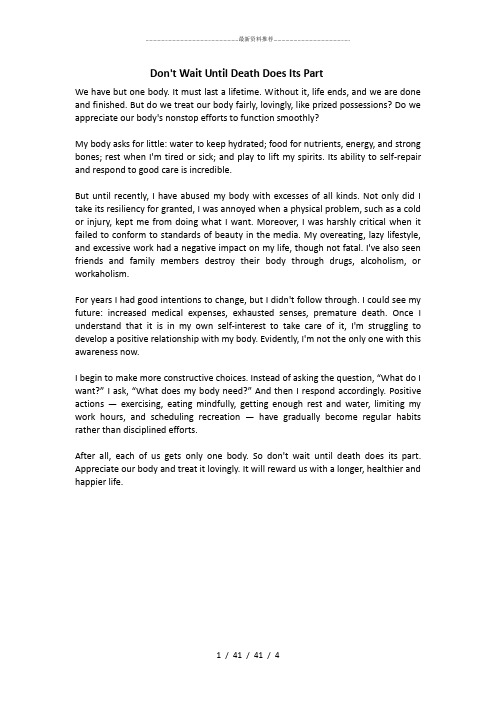
Don't Wait Until Death Does Its PartWe have but one body. It must last a lifetime. Without it, life ends, and we are done and finished. But do we treat our body fairly, lovingly, like prized possessions? Do we appreciate our body's nonstop efforts to function smoothly?My body asks for little: water to keep hydrated; food for nutrients, energy, and strong bones; rest when I'm tired or sick; and play to lift my spirits. Its ability to self-repair and respond to good care is incredible.But until recently, I have abused my body with excesses of all kinds. Not only did I take its resiliency for granted, I was annoyed when a physical problem, such as a cold or injury, kept me from doing what I want. Moreover, I was harshly critical when it failed to conform to standards of beauty in the media. My overeating, lazy lifestyle, and excessive work had a negative impact on my life, though not fatal. I've also seen friends and family members destroy their body through drugs, alcoholism, or workaholism.For years I had good intentions to change, but I didn't follow through. I could see my future: increased medical expenses, exhausted senses, premature death. Once I understand that it is in my own self-interest to take care of it, I'm struggling to develop a positive relationship with my body. Evidently, I'm not the only one with this awareness now.I begin to make more constructive choices. Instead of asking the question, “What do I want?” I ask, “What does my body need?” And then I respond accordingly. Positi ve actions —exercising, eating mindfully, getting enough rest and water, limiting my work hours, and scheduling recreation —have gradually become regular habits rather than disciplined efforts.After all, each of us gets only one body. So don't wait until death does its part. Appreciate our body and treat it lovingly. It will reward us with a longer, healthier and happier life.不要坐等死忙伸出魔爪我们只有一个身体。
大学英语教材课文加翻译
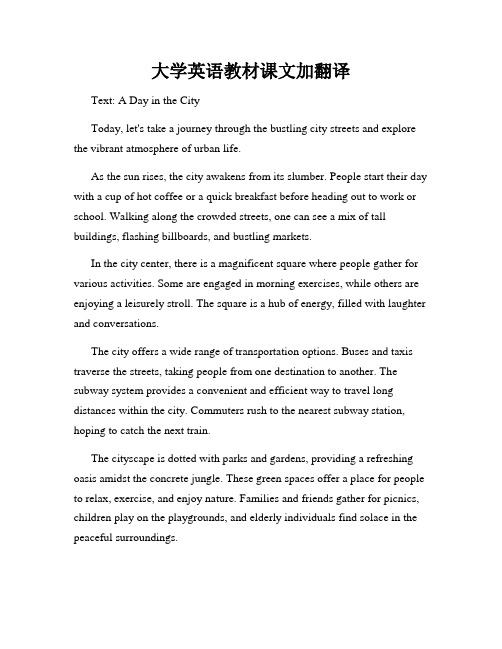
大学英语教材课文加翻译Text: A Day in the CityToday, let's take a journey through the bustling city streets and explore the vibrant atmosphere of urban life.As the sun rises, the city awakens from its slumber. People start their day with a cup of hot coffee or a quick breakfast before heading out to work or school. Walking along the crowded streets, one can see a mix of tall buildings, flashing billboards, and bustling markets.In the city center, there is a magnificent square where people gather for various activities. Some are engaged in morning exercises, while others are enjoying a leisurely stroll. The square is a hub of energy, filled with laughter and conversations.The city offers a wide range of transportation options. Buses and taxis traverse the streets, taking people from one destination to another. The subway system provides a convenient and efficient way to travel long distances within the city. Commuters rush to the nearest subway station, hoping to catch the next train.The cityscape is dotted with parks and gardens, providing a refreshing oasis amidst the concrete jungle. These green spaces offer a place for people to relax, exercise, and enjoy nature. Families and friends gather for picnics, children play on the playgrounds, and elderly individuals find solace in the peaceful surroundings.Street vendors line the sidewalks, selling a variety of goods and snacks. The aroma of freshly cooked food fills the air, enticing passersby to satisfy their cravings. From traditional local delicacies to international cuisines, the city is a paradise for food lovers. People stop by food stalls, grab a quick bite, and continue their journey.Beyond the busy streets, the city is also home to numerous cultural attractions. Museums, art galleries, and theaters offer a glimpse into the rich history and artistic heritage of the region. Tourists and locals alike visit these establishments, immersing themselves in the world of creativity and inspiration.The city never sleeps. As the day turns to night, the city lights up with a myriad of colors. Neon signs illuminate the streets, creating a vibrant and lively atmosphere. Restaurants and cafes come alive, filled with laughter and conversation. Night markets offer unique shopping experiences, with vendors selling a wide range of products.Overall, a day in the city is an exciting and dynamic experience. From the moment the sun rises to the time it sets, the city buzzes with life and energy. Whether it's exploring the bustling streets, enjoying delicious food, or immersing in cultural experiences, the city offers something for everyone.翻译:课文:城市中的一天今天,让我们一起穿越繁忙的城市街道,探索都市生活中充满活力的氛围。
(完整版)Unit10TheIdiocyofUrbanLife课文翻译综合教程四(2)

Unit 10The Idiocy of Urban LifeHenry Fairlie1 Between about 3 a.m. and 6 a.m. the life of the city is civil. Occasionally the lonefootsteps of someone walking to or from work echo along the sidewalk. All work that has to be done at those hours is useful -in bakeries, for example. Even the newspaper presses stop turning forests into lies. Now and then a car comes out of the silence and cruises easily through the blinking traffic lights. The natural inhabitants of the city come out from damp basements and cellars. With their pink ears and paws, sleek, well-groomed, their whiskers combed, rats are true city dwellers. Urban life, during the hours when they reign, is urbane.2 These rats are social creatures, as you can tell if you look out on the city streetduring an insomniac night. But after 6 a.m., the two-legged, daytime creatures of the city begin to stir; and it is they, not the rats, who bring the rat race. You might think that human beings congregate in large cities because they are gregarious. The opposite is true. Urban life today is aggressively individualistic and atomized. Cities are not social places.3 The lunacy of modern city life lies first in the fact that most city dwellers try tolive outside the city boundaries. So the two-legged creatures have created suburbs, exurbs, and finally rururbs (rubs to some). Disdaining rural life, they try to create simulations of it. No effort is spared to let city dwellers imagine they are living anywhere but in a city: patches of grass in the more modest suburbs, broader spreads in the richer ones further out; prim new trees planted along the streets; at the foot of the larger backyards, a pretense to bosky woodlands.4 The professional people buy second homes in the country as soon as they canafford them, and as early as possible on Friday head out of the city they have created.The New York intellectuals and artists quaintly say they are “going to the country”for the weekend or the summer, but in fact they have created a little Manhattan-by-the-Sea around the Hamptons, spreading over the Long Island6 potato fields whose earlier solitude was presumably the reason why they first went there. City dwellers take the city with them to the country, for they will not live without its pamperings. The main streets of America’s small towns, which used to have hardware and dry goods stores, are now strips of boutiques. Old-fashioned barbers become unisex hairdressing salons. The brown rats stay in the cities becauseof the filth the humans leave during the day. The rats clean it up at night. Soon the countryside will be just as nourishing to them, as the city dwellers take their filth with them.5 Work still gives meaning to rural life, the family, and churches. But in the citytoday work and home, family and church, are separated. What the office workers do for a living is not part of their home life. At the same time they maintain the pointless frenzy of their work hours in their hours off. They rush from the office to jog, to the gym or the YMCA pool, to work at their play with the same joylessness.6 Even though the offices of today’s businesses in the city are themselves movingout to the suburbs, this does not necessarily bring the workers back closer to their workplace. It merely means that to the rush-hour traffic into the city there is now added a rush-hour traffic out to the suburbs in the morning, and back around and across the city in the evening. As the farmer walks down to his farm in the morning, the city dweller is dressing for the first idiocy of his day, which he not only accepts but even seeks -the journey to work.7 In the modern office building in the city there are windows that don’t open. Thisis perhaps the most symbolic lunacy of all. Outdoors is something you can look at through glass but not to touch or hear. These windows are a scandal because they endanger the lives of office workers in case of fire. But no less grievous, even on the fairest spring or fall day the workers cannot put their heads outside. Thus it is not surprising that the urban worker has no knowledge of the seasons. He is aware simply that in some months there is air conditioning, and in others through the same vents come fetid central heating. Even outside at home in their suburbs the city dw ellers may know that sometimes it’s hot, and sometimes it’s cold, but no true sense of the rhythms of the seasons is to be had from a lawn in the backyard and a few spindly trees struggling to survive.8 The city dweller reels from unreality to unreality through each day, alwaystrying to recover the rural life that has been surrendered for the city lights. No city dweller, even in the suburbs, knows the wonder of a pitch-dark country lane at night.Nor does he naturally get any exercise from his work.9 Every European points out that Americans are the most round-shoulderedpeople in the world. Few of them carry themselves with an upright stance, althougha correct stance is the first precondition of letting your lungs breathe naturally anddeeply. Electric typewriters cut down the amount of physical exertion needed to hit the keys; the buttons of a word processor need even less effort, as you can tell fromthe posture of those who use them. They rush out to jog or otherwise Fonda-ize their leisure to try to repair the damage done during the day.10 Everything in urban life is an effort either to simulate rural life or to compensatefor its loss by artificial means. It is from this day-to-day existence of unreality, pretence, and idiocy that the city people, slumping along their streets even when scurrying, never looking up at their buildings, far less the sky, have the insolence to disdain and mock the useful and rewarding life of the country people who support them. Now go out and carry home a Douglas fir, call it a Christmas tree, and enjoy 12 days of contact with nature. Of course city dwellers don’t know it once had roots.城市生活之蠢行亨利·费尔利1 每天凌晨3点到6点,城市生活文明有礼。
大学基础英语课文翻译

Unit 1 包装设计销售的艺术在于包装Primo An geli 的工作室位于旧金山的一个时尚区里,在这里你可以看到怪异的流行艺术之作。
一个五英尺长的香肠在壁画上盯着你看,一块巨大的花岗岩被放置在干瘪的多福饼堆成的塔上。
我惊叹道:这些多福饼如何承受得了呀!Angeli解释说:"那块石头不是花岗岩而是制型纸板做的。
"和这里的很多东西一样,这个多福饼塔更多的是一种隐喻,而不是一个有明确主旨的艺术作品。
在我们身后的那面墙上是Angeli和他雇员创作的样品——一排排垒起来的空箱子、瓶子、纸板盒和罐头盒。
Angeli说:"消费者与包装之间是有联系的"。
包装有时被称为"沉默的推销员",但它们确实起到了促销的作用。
它们可以使香皂、洗发水、婴儿爽身粉、松饼混合料这些普通的东西成为人们渴求之物。
它们使人们渴求那些他们不需要,甚至不想要的东西。
在你花上8秒去选购洗涤剂或冷冻比萨的时候,那些包装在你耳边或高声或低语,夸耀着商品的美味、优质、价廉,以及它的奢华。
所有的声音足以引起你的兴趣。
这也就难怪设计、制作、推销包装这一集艺术、技巧、科学甚至一点欺骗色彩于一体的商业活动能做得如此生机勃勃。
要真正了解包装的作用,你得先设想一个没有包装的世界。
假设整个超市的商品都是同一样式:牙膏装在消过毒的白色软管里,早餐食品放在蜡纸袋里。
这个店里的商品也许和其他地方的差不多或许更好一点,价格也优惠,而且售货员机敏,衣着也漂亮,但仅凭这些想在今天的零售竞争中占一席之地是不太可能的了。
市场调查员Da vis Masten说包装的挑战在于创造顾客认同的喜好,而不是反映顾客的真正喜好。
以Primo An geli为一出口到美国的意大利咖啡设计包装为例,他没有把美国人身着浴袍时的邋遢形象设计为标签图案。
- 1、下载文档前请自行甄别文档内容的完整性,平台不提供额外的编辑、内容补充、找答案等附加服务。
- 2、"仅部分预览"的文档,不可在线预览部分如存在完整性等问题,可反馈申请退款(可完整预览的文档不适用该条件!)。
- 3、如文档侵犯您的权益,请联系客服反馈,我们会尽快为您处理(人工客服工作时间:9:00-18:30)。
城市学院英语课文翻译Don't Wait Until Death Does Its PartWe have but one body. It must last a lifetime. Without it, life ends, and we are done and finished. But do we treat our body fairly, lovingly, like prized possessions? Do we appreciate our body's nonstop efforts to function smoothly?My body asks for little: water to keep hydrated; food for nutrients, energy, and strong bones; rest when I'm tired or sick; and play to lift my spirits. Its ability to self-repair and respond to good care is incredible.But until recently, I have abused my body with excesses of all kinds. Not only did I take its resiliency for granted, I was annoyed when a physical problem, such as a cold or injury, kept me from doing what I want. Moreover, I was harshly critical when it failed to conform to standards of beauty in the media. My overeating, lazy lifestyle, and excessive work had a negative impact on my life, though not fatal. I've also seen friends and family members destroy their body through drugs, alcoholism, or workaholism.For years I had good intentions to change, but I didn't follow through. I could see my future: increased medical expenses, exhausted senses, premature death. Once I understand that it is in my own self-interest to take care of it, I'm struggling to develop a positive relationship with my body. Evidently, I'm not the only one with this awareness now.I begin to make more constructive choices. Instead of asking the question, “What do I want?” I ask, “What does my body need?” And then I respond acc ordingly. Positive actions — exercising, eating mindfully, getting enough rest and water, limiting my work hours, and scheduling recreation — have gradually become regular habits rather than disciplined efforts.After all, each of us gets only one body. So don't wait until death does its part. Appreciate our body and treat it lovingly. It will reward us with a longer, healthier and happier life.不要坐等死忙伸出魔爪我们只有一个身体。
必须延续一辈子。
没有它,人生便告终结,我们也就玩完了。
但是,我们对待自己的身体是否适度、钟爱,就像爱惜珍贵的财产一样呢?对于身体从不间歇地顺畅运转的努力,我们是否珍惜?我的身体要求很少:需要水来补给水分;需要食物来提供营养,能量和强壮的骨骼;累了或病了时需要休息;还需要娱乐来让我情绪高涨。
身体的自我修复与反馈爱护的能力是惊人的。
但在此前的日子里,我都在对自己的身体实施种种伤害。
我不仅以其韧性看做是理所当然的,而且当身体出现一点小毛病,如感冒或受伤,使我没法去做想做的事,我便会发火。
而且,当媒体不符合媒体宣传的审美标准时,我还会粗暴的对其加以挑剔。
我的暴饮暴食,懒惰的生活方式,和过度工作都给我的生命带来了虽不致命但却很负面的影响。
我也有目睹过朋友和家人用吸毒、酗酒或疯狂的工作来摧毁他们的身体。
多年来,我有过改变现状的良好愿望,但都没有坚持到底。
我可以预见自己的未来:医疗费用增加,感官衰竭,英年早逝。
一旦明白了爱护身体是在维护自己的利益,我便努力去培养与我自己身体的积极关系。
很显然,现在我不是唯一有这种意识的人。
我开始做出更富有建设性的选择了。
我不再问“我需要什么?”而改问“我的身体需要什么?”然后根据需要做出相应的回应。
采取积极的行动,如锻炼,注意饮食,保证足够的休息和水分,限制工作时间,安排娱乐活动等,这些已逐渐成为我的常规习惯,而不再是需要去强制完成的努力。
毕竟,我们每个人都只有一个身体。
所以不要等到死亡伸出魔爪。
珍惜并善待我们的身体,它会以更加长寿、健康和幸福的生活回报我们。
Punctuality Pays !One of the cultural differences that tends to annoy Americans has to do with understanding of punctuality. Getting ahead at work starts with getting to work on time!If you come from a culture that has a more relaxed view of time, you're likely to be surprised at how serious Americans are about time. While not all Americans are punctual all the time, the society as a whole operates on the basis of well-kept schedules. This is true in personal and community life as well as in U.S. business culture.Here's a real-life story that happened to me recently. I had scheduled a business meeting with a team from India, but had somehow forgotten to log it into my schedule. Arriving at my office 30 minutes after the appointment, I found a voice message telling me the team was waiting for me in the meeting room. Being afraid that I had missed the appointment, I hurried in, and found them happily chatting together. Their attitude was “Ah! You're here! We can start now!”If the team had been American, it's likely they would have been annoyed, and unlikely they would have waited more than 10 minutes — at the most. They would have left me a message asking to reschedule the meeting. Why? Because American-style appointments have a firm end as well as start time, and if you start late you won't be able to finish the business at hand without running beyond the scheduled ending time.If you're new to working in the United States, doing business with the U.S., or working for an American company overseas, here are a few tips for your everyday behavior around appointments and punctuality. They are sure to help you get ahead with your American colleagues:Schedule meetings and appointments in advance — a few days, a week, even a month in advance.Always make appointments for in-person meetings. Don't just show up and expect people to make time to talk with you.If you think you're going to be more than a few minutes late for any appointment, call and let the other party know you're running late.Plan your own time so that you can be punctual for appointments you have made. Avoid changing plans at the last minute.守时有回报有一种常会惹恼美国人的文化差异关系到对守时的不同理解。
